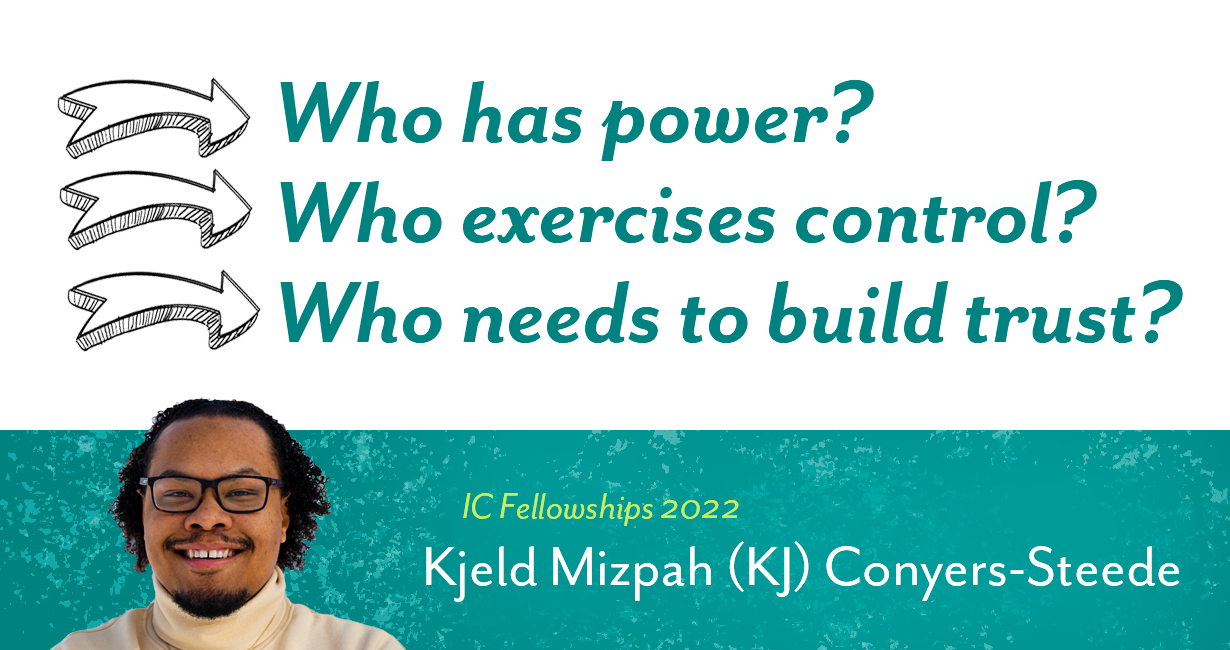Who has power? Who exercises control? Who needs to build trust?

Navigating the shift of meaningful economic development
Navigating Power, Control, and Trust has impacted me since the age of 10 years. At that age, I realized how our colonial history shapes and impacts our present and future. As an individual whose legal nationality is a British Overseas Territory Citizen, with connections with Britain’s oldest colonial territory, navigating power, control, and trust is in my cultural DNA.

My quest to understand this impact started with Bermuda building education policies that moved away from embracing a community-centric approach to social cohesion, and placing value instead on control and power.
Social cohesion refers to the strength of relationships and the sense of solidarity among members of a community.
– Healthy People 2030
Seeing this battle firsthand sparked my journey as a policy advocate who strives to understand the why of using policy development as a form of control. The older I get, the more I realize that social cohesion thrives when communities have economic sovereignty through embracing innovative economic opportunities.
Linear versus circular approaches to economic development
Countries that operate under a capitalistic society govern themselves through a linear lens: this can be seen when we approach economic growth. We see economic growth as a zero-sum game instead of encouraging a circular approach to economic development. Since the end of World War II, developed countries, especially those within the Commonwealth, have sought to develop a better understanding of how the policy development cycle and communities can better align (Howlett et al. 17). This notion is why I wanted to study political science; however, as I enter my first decade working within the policy development ecosystem, I realize the struggle between power, control, and developing trust in that ecosystem is causing a shift in our governance structure.
This shift seems unconventional, and some may say Covid-19 sparked it, but if you look at the policy ecosystem as a system, this shift has been in the works for centuries. This shift stems from the identity crisis of being a collection of colonized people. This grand experiment of Westminster democracy has been underway for the last two centuries, yet we still operate in the format of our forefathers. Social norms have evolved, but our policy creation structures still have lasting traits from our European imperialist origin story.
The internal battle between defining power and exercising control can be seen through the evolution of former European colonies’ transition to statehood (Phillips and Sharman 2). A prime example is Canada’s evolution from a company state, to a dominion, to a carbon copy of its colonial forefather (Britain) that takes an imperialistic approach to governance. Canada’s approach to Confederation was based on the importance of centralizing its globalization ambition. This has limited provinces’ economic and political equity, causing generations of policy leaders to crave power to control the agenda-setting process: this has pulled the country into a federation crisis.
Social norms have evolved, but our policy creation structures still have lasting traits from our European imperialist origin story.
As company-states evolved into nations, their desire to move away from colonial control created a domestic form of colonization which takes the form of federalism. The idea of sharing resources, international relations goals and trade seems excellent on paper. Nevertheless, since the first North American federation was created, the policy development process has been based on defining power and exercising control, creating a culture of mistrust within all levels of government. Our quest for centralization has caused a modern form of colonization that hinders collaboration and creativity within the ecosystem. Once again, this caused the power to shift, causing the battle for control to continue.
This battle is seen clearly when policy researchers identify problems within their communities and strive to develop meaningful public solutions through a cause-and-effect lens, one of the linear thinking patterns mentioned above. Our current mechanism supports this linear approach to policy creation with a simple formula: If the community has problem A, we use solution B to fix it because solution B comes from a “specialized” stakeholder group that understands the sport of policy. The solution B model is also supported by civil servants who have been educated to follow political influence instead of being encouraged to adopt an intrapreneurship mindset to policy development. Does solution B work? – the chance of it working is limited, leaving communities mistrusting the policy creation process. Sadly, one thing Solution B does very well is secure power.
If the community has problem A, we use solution B to fix it because solution B comes from a “specialized” stakeholder group that understands the sport of policy.

Traditional policy development is a sport, not a community-centric governance tool
The policy development sport is a prime example that the sun has not set over the empire, and I cannot blame society for that. We approach our governments and jurisdictions with a Frankenstein approach to policy development within a culture that seeks power and control and does not embrace diversity and intersectionality. The battle over power and control within the policy ecosystem will always dilute the policy creation process. If we were a dominion again, our current policy development cycle would be successful. Nevertheless, we live in complex jurisdictions, with multiple communities navigating social cohesion and challenges. We need an agenda-setting process that automatically checks its unconscious bias because currently, we are building mistrust surrounding:
- Ideation process of policy options
- Choosing an option; and
- The implementation and evaluation of policy.
If the system loses trust, the foundation of community governance could be called into question. If the foundation of governance is questioned, the movement of dismantling the political mechanism starts to evolve. This can be seen within the Maritimes, especially among small and isolated communities. As I travel through rural and small communities, it is clear that traditional policy development has caused a culture of mistrust to form. This mistrust has caused these communities to lose their interconnectedness and regional identity because of the shifting focus on urban development. This clouded approach to regional development limits strategic foresight and has the potential to damage social cohesion within the region.
As a political scientist, a lack of awareness about who holds power, exercises control, and needs to build trust in the process motivates me to be in the community. When I am in a community, I seek to understand the impacts and limitations on community and economic development. Covid-19 has sparked a battle between power and control over economic sovereignty. This will cause divisions as communities navigate the rebound from Covid-19.
This can be seen within the Maritimes, especially among small and isolated communities. As I travel through rural and small communities, it is clear that traditional policy development has caused a culture of mistrust to form.
As communities feel the impact of economic policy decisions, I ask, “where is the economic development power shifting and who will hold power?” During my fellowship with Inspiring Communities, this question will be my North star; I will engage with communities and explore the tools needed to change our approach to community and economic development. To achieve this, I want to explore how we might develop a sense of social cohesion within the economic development space, as working through complex regional problems within silos should no longer be the status quo. Join me as I engage with the community and explore how we can approach a sense of economic empowerment within small and isolated communities.
I hope you join me on my adventure.
Kjeld Mizpah (KJ) Conyers-Steede
Fellow at Inspiring Communities
Principal Consultant of Catalyst Conversation Strategies
(T): @catalystconvo
Join the mailing list, by visiting Catalyst Conversation Strategies
Work Cited
Phillips, Andrew, and J. C. Sharman. Outsourcing Empire: How Company-States Made the Modern World. Princeton University Press, 2022.
Howlett, Michael, et al. Studying Public Policy: Policy Cycles & Policy Subsystems. 3rd ed., Oxford University Press, 2003.
Image Credits
- Photo supplied by the author
- Polo photo by Bob Jenkin: https://www.pexels.com/photo/two-men-playing-polo-12754387/
Share this:
Comments are closed